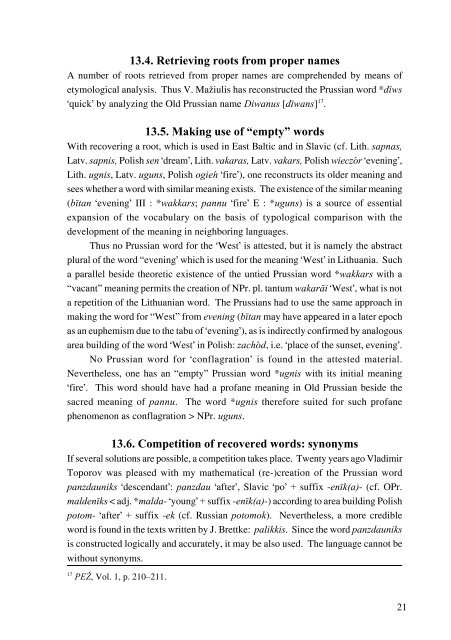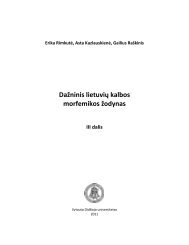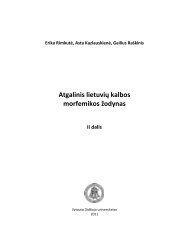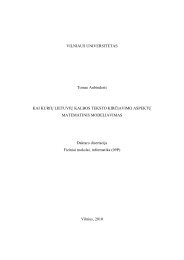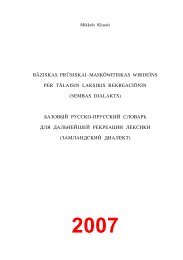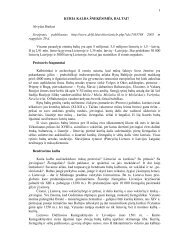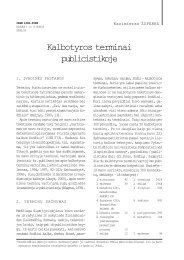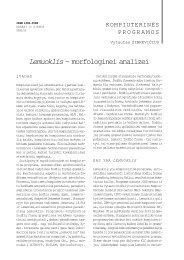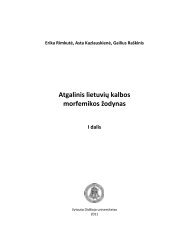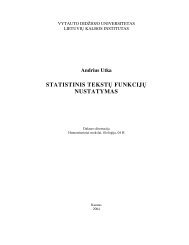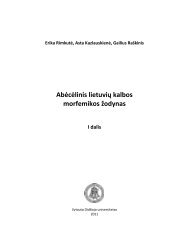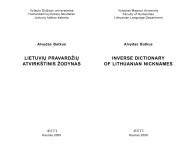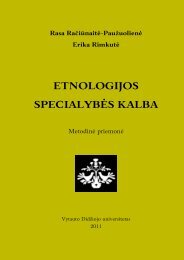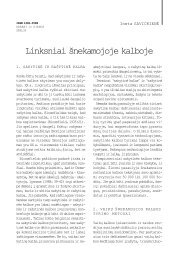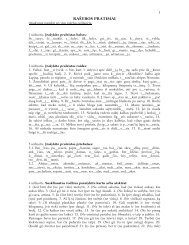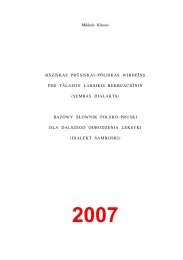- Page 1 and 2: PRVSSOLOGIA KLOSSIANA: LINGVA BORVS
- Page 3 and 4: © Letas Palmaitis Institut Europƒ
- Page 5 and 6: PREFACE This work is only a little
- Page 7 and 8: have absorbed all influences during
- Page 9 and 10: The distinctive feature of the 1 st
- Page 11 and 12: Next, one must have in mind that th
- Page 13 and 14: common Baltic-Slavic level, but wit
- Page 15 and 16: III, fem. Antr` Maddla III, neutr.
- Page 17 and 18: occasionally appeared due to contam
- Page 19 and 20: ‘and what more he has done agains
- Page 21: are also indisputable Prussicisms t
- Page 25 and 26: As urban culture spread, terms for
- Page 27 and 28: In fact, the word grijkans is a dir
- Page 29 and 30: GRAMMATICAL ABBREVIATIONS ac active
- Page 31 and 32: 16 f : subba subses subsei subban s
- Page 33 and 34: 27 f : weselîngi weselîngis wesel
- Page 35 and 36: 40 m : kûgis kûges kûìu kûgin
- Page 37 and 38: 69 n : îmtan îmtas imtasmu îmtan
- Page 39 and 40: 106: smeîtwei ps smejja pt smîja/
- Page 41 and 42: 139: krikstîtun/îtwei ps krikstij
- Page 43 and 44: vergleichende Sprachwissenschaft de
- Page 45 and 46: 44 Prûsiskan alfabçtan A a ~ ` B
- Page 47 and 48: AFRIKÎNINI [Afrikîns drv] Africa
- Page 49 and 50: ALGENÎKS [Dein`algenikamans 95 dr
- Page 51 and 52: APST~KTAN n [Abstotten E 395] lid
- Page 53 and 54: ASTÔNDESIMTS [Astônei MK] eighty
- Page 55 and 56: AÛKTAN [Aucktimmien 91 VM] height
- Page 57 and 58: AUSTEBTWEI [Stebtwei drv] to be am
- Page 59 and 60: AZZARAN n [Assaran E 60] lake AZZE
- Page 61 and 62: BETIKSLIS aj [Tikslin drv] groundl
- Page 63 and 64: BL~NDEWINGI av [Bl`nda MK] erroneou
- Page 65 and 66: BUMBI [bomb MK] bomb BUMBÔNS [Bo
- Page 67 and 68: DAG~UGIS [Dagoaugis E 638] summer
- Page 69 and 70: DEÎKTAN n [deicktan 125] place, [
- Page 71 and 72: DÇNGTUN [dangus E 3 VM] to bend o
- Page 73 and 74:
DÎRAN [Dirîtwei drv MK] look DIR
- Page 75 and 76:
DRIBTWEI [Drimbis E 483 VM] to flo
- Page 77 and 78:
DWASSAN [Dwestwei drv, dvasa/dvasa
- Page 79 and 80:
EBJAD~TWEI [Jad`twei drv] to go ro
- Page 81 and 82:
EÎSKINSN~ [Eîskintun drv] explan
- Page 83 and 84:
EMPR~BUTSKAN av [enpr`butskan 51, 8
- Page 85 and 86:
ÇNGLISKAN [Çngliskas + Englisch
- Page 87 and 88:
ENPR~BUTSKAN ↑ Empr`butskan av en
- Page 89 and 90:
ENWA‚NGISKAS aj [enw`ngiskan 133
- Page 91 and 92:
ERSW~IKSTINA ↑ Ersw`ikstintun ps
- Page 93 and 94:
ETMERKTUN SI [atsimerkti MK] to op
- Page 95 and 96:
ETWÇRPJA ↑ Etwçrptun ps 1 sg et
- Page 97 and 98:
FOLKLÔRI [Folklore MK] folklore F
- Page 99 and 100:
G~RBIKAS pl [Garb` drv + [grîmika
- Page 101 and 102:
GÇRBAITI ↑ Gçrbtun ip 2 pl Gerb
- Page 103 and 104:
GÎWANS ↑ Gîws aj acc pl gijwans
- Page 105 and 106:
GR~UDU av [engraudîs 67 MK] unfort
- Page 107 and 108:
GÛBI ↑ Çitwei, giving doing pt
- Page 109 and 110:
ÎLA [ylo E 510] awl ILGAI av [ilg
- Page 111 and 112:
INTUICIÔNI [Intuition MK] intuiti
- Page 113 and 114:
IZLAUKÎSN~ [Enlaukîtun drv] inqu
- Page 115 and 116:
IZSUPTUN [Suptun drv] to scatter (
- Page 117 and 118:
JÛDINI [Jûdi drv] Jewish woman J
- Page 119 and 120:
KAÎNA [kaina + cena MK] price KAI
- Page 121 and 122:
KAMUTTIS [Kams, Naguttis + kamuoly
- Page 123 and 124:
KAS pn nom sg m [kas 37] who KAS~J
- Page 125 and 126:
KELLI [VM] how much KELLIN n [Kela
- Page 127 and 128:
KÎRKIN ↑ Kîrki acc kirken II 9
- Page 129 and 130:
KLAWIATÛRI [Klaviatur Nx] keyboar
- Page 131 and 132:
KÔNWERTITUN [konvertieren Nx] to
- Page 133 and 134:
KRÎSLIN n [Creslan E 217] armchai
- Page 135 and 136:
KUNSTISKAS aj [Kunsta drv] artific
- Page 137 and 138:
Í Í [ki] palatal k Í~SI nom sg f
- Page 139 and 140:
L~IMAN [L`ims drv] wealth L~IMINTI
- Page 141 and 142:
LAPPINIS [Lapinis E 359] spoon LAP
- Page 143 and 144:
LIGZDAN [lizdas, ligzda Ma] nest L
- Page 145 and 146:
LUNKAN n [Lunkan E 644] bast LUNKI
- Page 147 and 148:
M~LDAISIS [maldaisimans 75 drv] pu
- Page 149 and 150:
M~UKTUN na acc [maukti + maukt + w
- Page 151 and 152:
MIKSISKAS aj nom sg m [Mixkai 17 V
- Page 153 and 154:
MÎSTIKI [Mystik MK] mystique MÎS
- Page 155 and 156:
MUZÎKI [music MK] music MUZIKÎTW
- Page 157 and 158:
N~WS f [Novis E 151] corpse NAWWAN
- Page 159 and 160:
NIGGEISTAS aj [Gçistun drv + niesp
- Page 161 and 162:
NÔWAITESNA [Nôwaitetun drv] calu
- Page 163 and 164:
ÔRKESTRANTI [Ôrkestran + Muzik`n
- Page 165 and 166:
PAGALBSENIS [pogalbenix 103 + poga
- Page 167 and 168:
PAKLUSMINGINS ↑ Paklusmings aj ac
- Page 169 and 170:
PAMEDDI [Pomesania DK, *Pamedç VM
- Page 171 and 172:
PARADÎZAN [Paradies MK] paradise
- Page 173 and 174:
PATIKINNUNS ↑ Patikîntun pc pt a
- Page 175 and 176:
PAZENTLIN [Zentlin + poþymis MK]
- Page 177 and 178:
PÇR prp acc [per 39, pçr(stans) 7
- Page 179 and 180:
PERKÛNIJA coll [Perkûms drv + pe
- Page 181 and 182:
PERÐLÛZISNAN ↑ Perðlûzisna ac
- Page 183 and 184:
PILS f [Sassenpile ON VM] castle,
- Page 185 and 186:
PLATÎSN~ [Platîtwei drv] payment
- Page 187 and 188:
PRAI‚LGINTAJS [Prailgintun drv]
- Page 189 and 190:
PRAWÎDISKAS aj nom sg m [Prawîds
- Page 191 and 192:
PRÇIPALIS [Senpaltwei, Zufall + p
- Page 193 and 194:
PRÔPORCIÔNI [Proportion MK] prop
- Page 195 and 196:
PUSNÇ [Pusne E 499] high boot PUS
- Page 197 and 198:
RAPS [Rapa E 2 VM] guardian RAPSS
- Page 199 and 200:
RETENÎKS [Retenîkan 63] Saviour
- Page 201 and 202:
RITTUS pl tantum [Ritus MK] ritual
- Page 203 and 204:
SAKRAMÇNTAN ↑ Sakramçnts acc Sa
- Page 205 and 206:
S~USIS [sausis JB MK] smallpox S~U
- Page 207 and 208:
SENGR~MBINTUN [Gr`mbintun drv] to
- Page 209 and 210:
SEPTÎNSIMTA [Warto E 210, Septinne
- Page 211 and 212:
SIRZDS aj [Sirzdan MK] middle SÎS
- Page 213 and 214:
SKRÎTWEI [Skrelle DIA MK] to circ
- Page 215 and 216:
SP~RTS av [sparts 107] very SP~RTS
- Page 217 and 218:
STAL~I ↑ Stalîtwei ps 3 stallç
- Page 219 and 220:
STIBBAN [Stibbins + Kraîsi, stumb
- Page 221 and 222:
SÛITENIKISKAS aj [Sûiteniks drv]
- Page 223 and 224:
SWINJAÎNA [Swinnistin + kiauliena
- Page 225 and 226:
ÐKURS [< szczur > þiurkë, þurk
- Page 227 and 228:
T TABERN~KULIN [tabernaculum MK] t
- Page 229 and 230:
T~WS nom sg [Taws 49 8 ] father TE
- Page 231 and 232:
TÇNSTUN [tiçnstwei 73 to drag (o
- Page 233 and 234:
TINKLASALÔNS [Internettan + Salô
- Page 235 and 236:
TRISDESÎMTS ord [Trîsdesimts MK]
- Page 237 and 238:
TWAJ~SEI ↑ Twajs dat sg f twai`sm
- Page 239 and 240:
URNI [Urne MK] urn ÛRS [Wurs E 6
- Page 241 and 242:
W~ISINTUN [Wçisis drv + vaisinti
- Page 243 and 244:
WANS ↑ Jûs acc wans 67 W~NS~ [W
- Page 245 and 246:
WÇISISKAS aj [Wçisin 109] fruity
- Page 247 and 248:
WIKKIS [Wickis E 270] vetch WÎKSL
- Page 249 and 250:
WÎRS [wijrs 87] man, husband WÎR
- Page 251 and 252:
WÛLINGIS aj [Wûla drv] rocky WÛ
- Page 253 and 254:
Z~MUKS [Somukis E 537] (pad)lock Z
- Page 255 and 256:
ZMÛNENAWINS nom sg m [Smonenaw±s
- Page 257 and 258:
256
- Page 259 and 260:
258
- Page 261 and 262:
accessible PREIÇIMINS aj [Preiçi
- Page 263 and 264:
adornment GRAZINTINNI [Grazzus drv
- Page 265 and 266:
allure v WILTUN [Prawiltun MK] all
- Page 267 and 268:
answer v ETR~TWEI [attr`twei 125]
- Page 269 and 270:
arrangement TEIK~SN~ [teikûsnan 1
- Page 271 and 272:
attempt v STENGTUN SI [Stengtun dr
- Page 273 and 274:
aker m PEKÛRIS [Peccore E 329 + T
- Page 275 and 276:
eam no: cross-beam over axle of a c
- Page 277 and 278:
esom KLAKST~ [Klexto E 333] betray
- Page 279 and 280:
less v ZIGN~TUN [Sign`t 77], (enti
- Page 281 and 282:
orer (drill) GR~NSTIS nom sg f [Gr
- Page 283 and 284:
igade BRIG~DI [Brigade MK], brigad
- Page 285 and 286:
us station AUTÔBUSADWARS [Gelz`pi
- Page 287 and 288:
captive PERG†ABTINIKS [Pergabtun
- Page 289 and 290:
cemetery KAPURNA [Caporne ON VM] c
- Page 291 and 292:
Christ KRISTUS nom sg m [Christs 5
- Page 293 and 294:
coachman WEZIKS [Weztun drv] coal
- Page 295 and 296:
common denominator EMPÎRINTS BIL
- Page 297 and 298:
configure v KÔNFIGURITUN [configu
- Page 299 and 300:
contribution ÇNDIJA [Endîtun drv
- Page 301 and 302:
count v GÎRBAUTUN [Gîrbis + Gçr
- Page 303 and 304:
cross no SKRÎZIS [Scrijsien 81] c
- Page 305 and 306:
D dagger STAKAMESSERIS [Stakameccz
- Page 307 and 308:
deceptive REDS aj [reddau 69], RED
- Page 309 and 310:
denunciator DENUNCI~NTS [Denunzian
- Page 311 and 312:
diligence (assiduity) SEÎLAWINGISK
- Page 313 and 314:
distance no T~LISKU [T`ls drv] dis
- Page 315 and 316:
drag v tr WÎLKTUN [Awilkis 472 VM
- Page 317 and 318:
dune KÛPA [kopa, k`pa MK], inhabi
- Page 319 and 320:
eel ANGURIS [Angurgis E 565] effec
- Page 321 and 322:
empty aj P~USTS aj [Pausto(catto)
- Page 323 and 324:
equinox EKWINÔKCIJAN [Äquinoktiu
- Page 325 and 326:
evolution EWÔLUCIÔNI [Evolution
- Page 327 and 328:
eyelash BRUWÎKA nom sg f [Wubri E
- Page 329 and 330:
feather PL~UGZDA [Plauxdine E 488
- Page 331 and 332:
finite WANGISKAS aj [enw`ngiskan 1
- Page 333 and 334:
floor TALS [Talus E 207], (storey)
- Page 335 and 336:
forget v (often, various things) M
- Page 337 and 338:
friendship GINNISKU [ginniskan 125
- Page 339 and 340:
gas-stove burner ring RÎNKIS [rin
- Page 341 and 342:
glade L~NDIS [lindan 57 VM], wild
- Page 343 and 344:
granary KLÎNAN [Clenan E 194] Gra
- Page 345 and 346:
guess v MÎRITWEI [ermîrit 69 VM]
- Page 347 and 348:
harvest ~USTS [Aust DIA MK], (reap
- Page 349 and 350:
her dat, acc DIN pn 3 encl ↑ dis
- Page 351 and 352:
honesty TEISÎWINGISKU [teisîwing
- Page 353 and 354:
humiliate v L~USTINTUN [laustineit
- Page 355 and 356:
improve v WALNINTUN [walnint 33] i
- Page 357 and 358:
infidelity NIDRÛWIS [nidruwien 55
- Page 359 and 360:
intercession PRAMADLIN n [Pra madl
- Page 361 and 362:
J jab (into) v BASTUN [embaddusisi
- Page 363 and 364:
key KLAÛTALS [Klaûtun MK], (keyb
- Page 365 and 366:
lack no NIS~TAUSN~ [Nis`tautwei dr
- Page 367 and 368:
leader MISTRAS nom sg m [Mistran 9
- Page 369 and 370:
lid (eyelid) WÛKAN [vokas + v`ks
- Page 371 and 372:
living GÎWS aj [gijwans 43 drv] l
- Page 373 and 374:
lucrative NAUDÎNGIS [naud` drv] l
- Page 375 and 376:
manifestation (feature) MANIFESTACI
- Page 377 and 378:
meander v W~NGRAUTWEI [W`ngars MK]
- Page 379 and 380:
milk DADDAN [Dadan E 687], (curdle
- Page 381 and 382:
modesty SÛITENIKISKU [Sûitenikis
- Page 383 and 384:
[Skatîtwei drv], move in having co
- Page 385 and 386:
Narev NARWIS nom sg m [Narew, Naur
- Page 387 and 388:
nibble v KAND~TUN [Kanstun + kand
- Page 389 and 390:
nothing of the kind EMPRÎKISKAI av
- Page 391 and 392:
Ockopirm (god Ockopirm) UKAPIRMAS n
- Page 393 and 394:
ordinal ÔRDINALS [Ordinal- MK] or
- Page 395 and 396:
pain GULSENIS [Gulsennien 105], to
- Page 397 and 398:
paste to v LIPÎNTUN prei (acc) [L
- Page 399 and 400:
percussion SANT~LKA [Sentçlktwei
- Page 401 and 402:
pioneer PAGAÛWENIKS [Pagaûtun dr
- Page 403 and 404:
poet PÔETS [poet MK] poetess PÔE
- Page 405 and 406:
potential PÔTENCIALIN [Potential
- Page 407 and 408:
previous PI‚RZDAUMS aj [Pirzdau
- Page 409 and 410:
proper PREISTALÎWINGIS aj [preist
- Page 411 and 412:
pupil of the eye WEÎDULS [Weyduli
- Page 413 and 414:
ace no (competition) SPÎJAS [Spî
- Page 415 and 416:
ecall (recollect) (at a moment) v P
- Page 417 and 418:
eign no RIKAÛSN~ [rickaûsnan 53]
- Page 419 and 420:
esettle v tr PRASKAJJINTUN [Etskaj
- Page 421 and 422:
evolve v WELTUN [Walis E 252 VM] r
- Page 423 and 424:
omanticism RÔMANTIKI [Romantik MK
- Page 425 and 426:
ustle no ÐLAMÎSN~ [Ðlamîtwei d
- Page 427 and 428:
satiate v (sate) S~TWINTUN [s`tuin
- Page 429 and 430:
second ord ~NTARS, gen ` ntras, ord
- Page 431 and 432:
Serene Highness PRASW~IKSTISTA [Du
- Page 433 and 434:
shawl PAST~ [Pasto E 494], shawl o
- Page 435 and 436:
shutter PI‚RZDLANGSTAN n [Perstl
- Page 437 and 438:
sit v (to be sitting) SÎNDÎTWEI
- Page 439 and 440:
smelt (sparling) MALKIS [Malkis E
- Page 441 and 442:
sound v (probe) ZÔNDITUN [Zôndi
- Page 443 and 444:
spinner (woman) SPENDIKKI [Spenstu
- Page 445 and 446:
stand v tr (to put, set) smb, smth
- Page 447 and 448:
stopping place ST~MINADEÎKTAN [Ha
- Page 449 and 450:
subject aj (to), subjected PAMESTS
- Page 451 and 452:
supply v PERZÛRGAUTUN [persurgaui
- Page 453 and 454:
sword grasp DÎGNA [Digno E 427] s
- Page 455 and 456:
tedious: to have a tedious time PRE
- Page 457 and 458:
then av STADDAN av [kadan I 13 MK],
- Page 459 and 460:
through PRA unaccented prp acc [pra
- Page 461 and 462:
torment no LAILÎSN~ [lailîsnan 6
- Page 463 and 464:
trench Ð~NCIS pl [Schanzen MK] tr
- Page 465 and 466:
twig tie (twig rope) GRÇNZTI [Gre
- Page 467 and 468:
unless IK TER MAZZAIS [nebent + ja
- Page 469 and 470:
vegetables SAKNIS nom pl f [saknes
- Page 471 and 472:
waist (loins) TALLIJA [Taillë MK]
- Page 473 and 474:
weasel MAZUKKA [Mosuco E 662] weat
- Page 475 and 476:
whitish GAÎLAWINGIS [Gaîls drv N
- Page 477 and 478:
wizard(ly) WAÎDILAWÎNGIS aj [Wai
- Page 479 and 480:
X Y yacht JACHTI [Jacht MK] yard P


